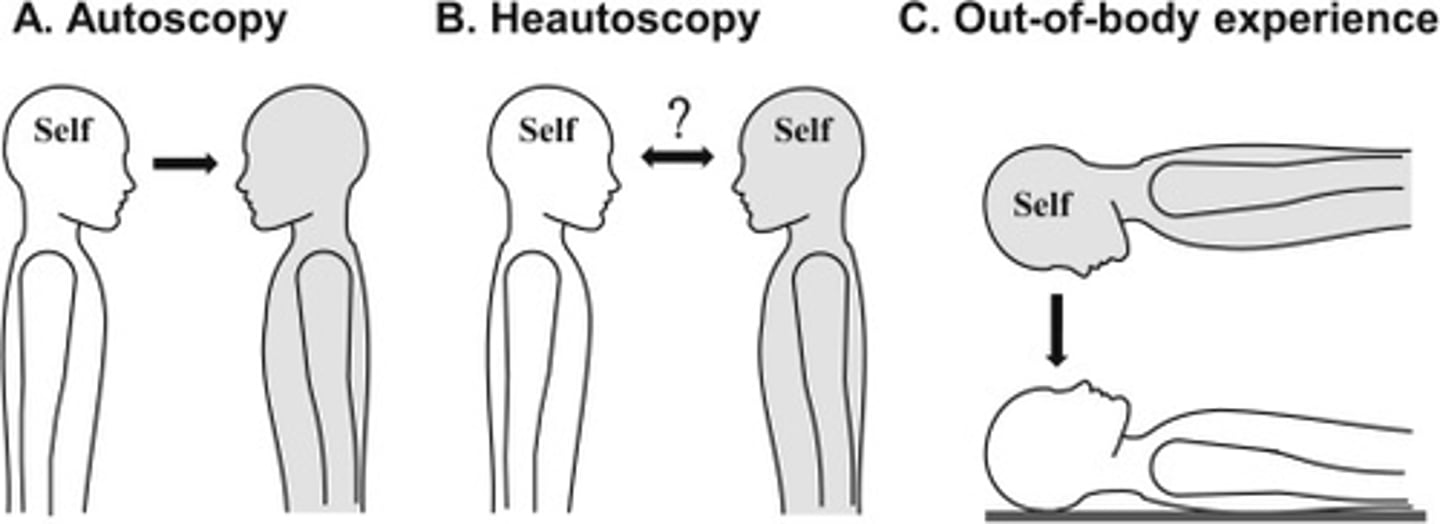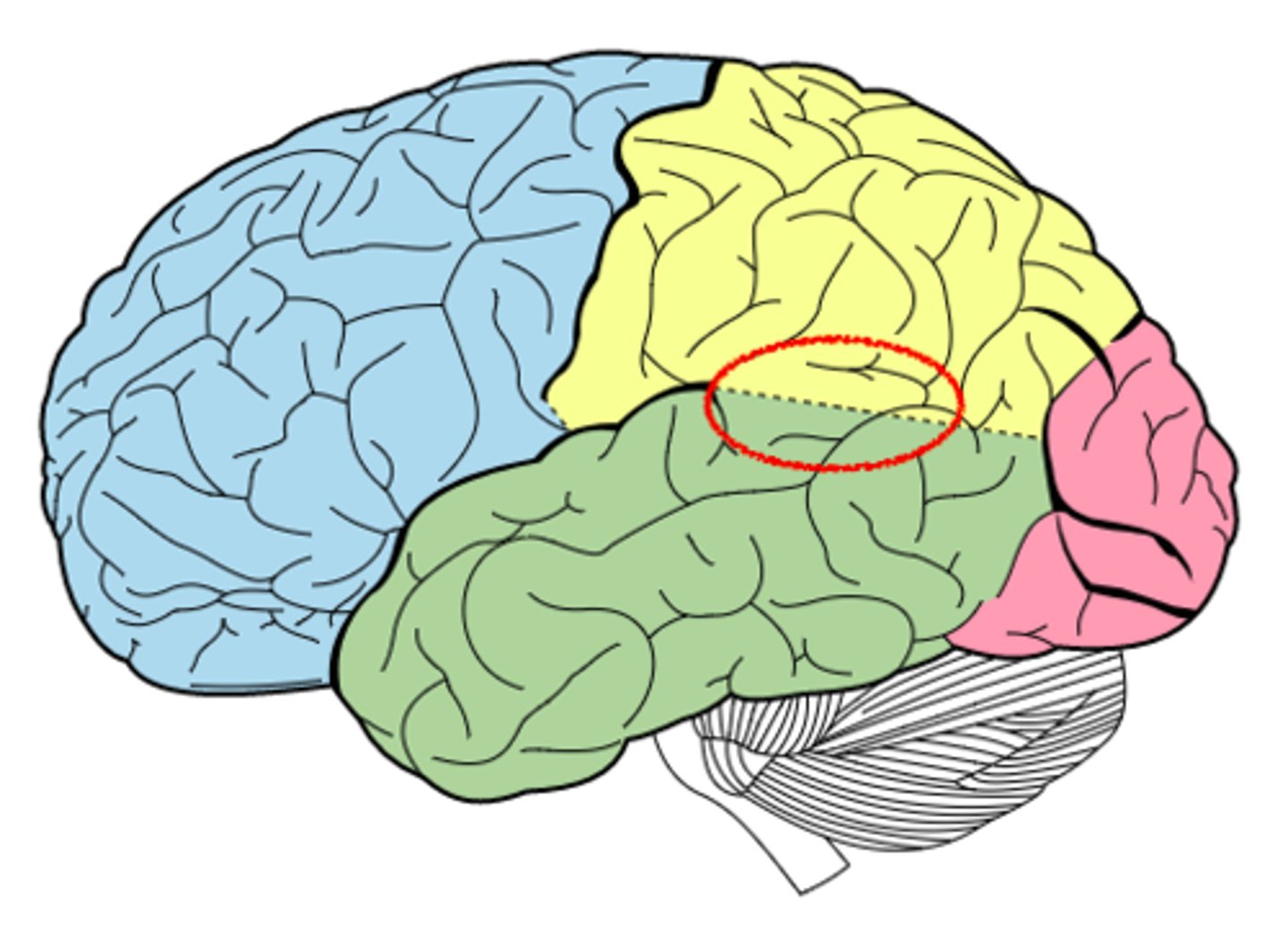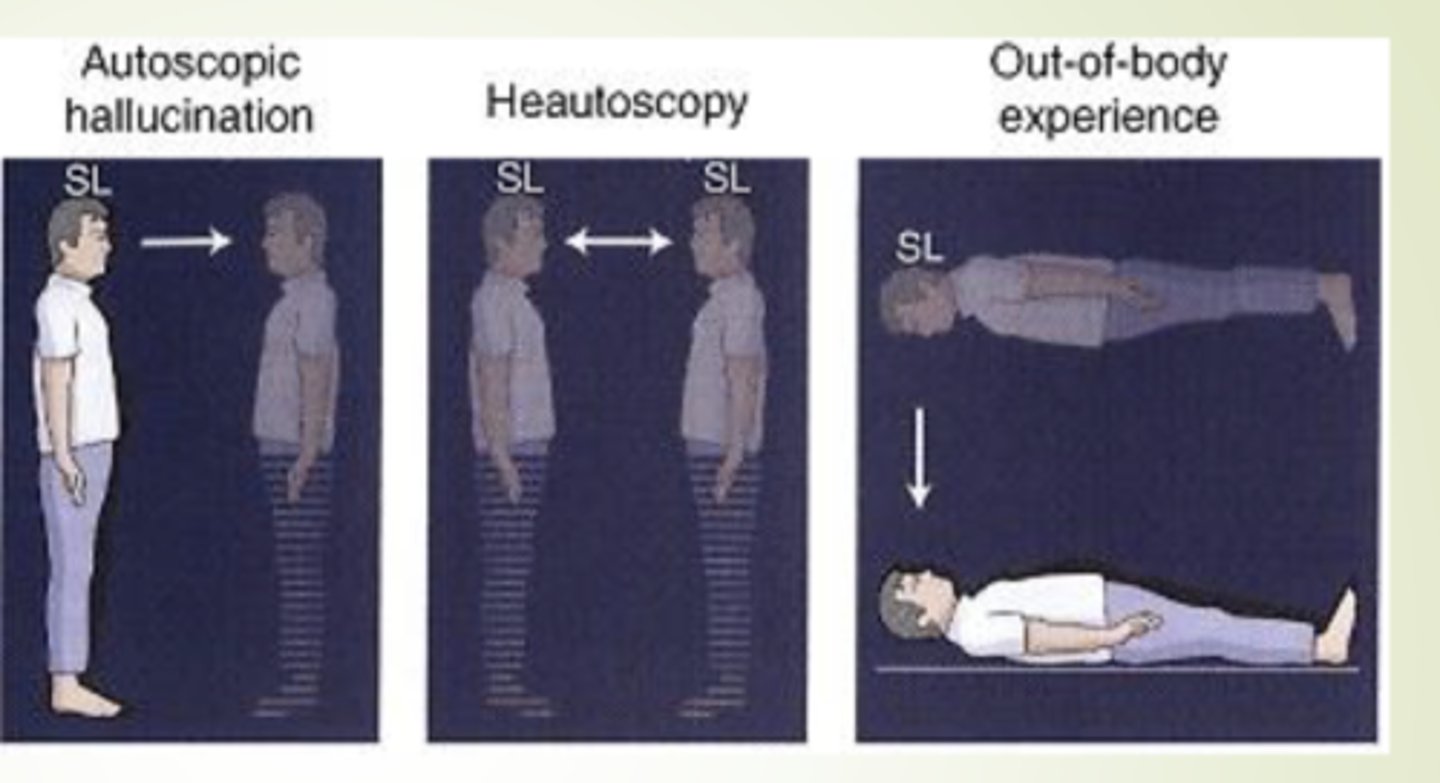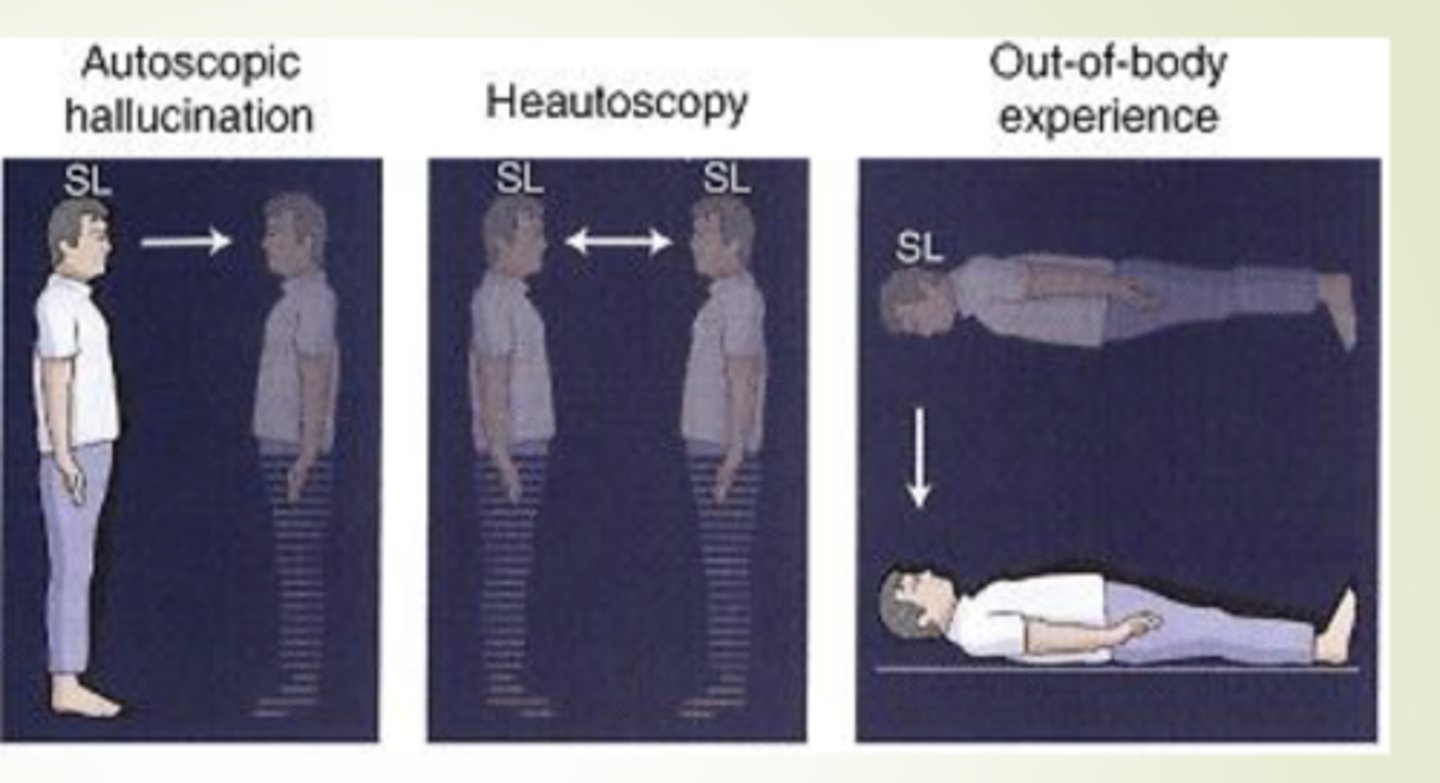NEUR Final Exam - self and social cognition
1/40
There's no tags or description
Looks like no tags are added yet.
Name | Mastery | Learn | Test | Matching | Spaced | Call with Kai |
|---|
No analytics yet
Send a link to your students to track their progress
41 Terms
4 regions involved in self-referential processing
dorsolateral prefrontal cortex, ventromedial pre frontal cortex, posterior cingulate cortex, medial/lateral parietal cortex
regions involved in subjective feelings
orbitofrontal cortex, anterior cingulate cortex, insula
Some psychologists attribute the risky behavior of adolescents to a mismatch between development of the prefrontal cortex and development of the limbic system. This is based on the fact that one of these two brain regions develops before the other. Which region develops first?
a. The prefrontal cortex
b. The limbic system
c. They develop at the same time
d. The cerebellum
The limbic system
3 multiple choice options
brain region(s) likely to be affected by adverse social events and chronic stress
pre frontal cortex and developing brain regions
perceptions of isolation are correlated with
higher morbidity and mortality, increased vascular resistance, higher blood pressure, fragmented sleep, sedentary lifestyles, decreased immunity, decreased impulse control
describe the case study of phineas gage
was in a railway work accident and sustained damage to his prefrontal cortex
personality changed from respectful to impulsive and reckless
disorders affecting social cognition
anti-social personality disorder, schizophrenia, autism spectrum disorder
antisocial personality disorder
aware of social norms but may disregard them, may lack empathy, low impulse control, increased aggression, may not care for the welfare for others
schizophrenia and autism
both heterogeneous disorders that lie on a spectrum
deficits in social perception (understanding cues)
difficulties understanding the mental state of others
autoscopic phenoma
person seems to be awake yet sees their body and the world from a location outside the body
Heautoscopic hallucination
see your own body and a view of the world from that location; left temporoparietal cortex

What area of the brain is most involved in body ownership?
a. mPFC
b. OFC
c. ACC
d. Temporoparietal cortex
temporoparietal cortex
3 multiple choice options
temporoparietal junction
involved in self processing and integrating multisensory body related info

xenomelia
rare condition in which able-bodied people experience life long desire for amputation because they feel a limb doesn't belong to their body
often limb on the left side and the right hemisphere is affected
no activation of right superior parietal lobe activation
superior parietal lobe
integration of somatosensory, visual and vestibular converge, critical for sensorimotor integration
self-reference effect
individuals are more likely to recall information if it is personally salient
brain region involved in self-reference effect
medial pre frontal cortex
brain region involved in maintaining positive self image
ventral anterior cingulate cortex
self descriptive personality and memory
self descriptive personality traits are not based on recent episodic memories
default mode network
network active at rest
related to self-referential processing
most active when inwardly focused
connected to memory system
deactivated during active tasks
brain regions in default mode network
prefrontal cortex, inferior parietal lobule, temporal parietal junction, lateral temporal cortex, precuneus, posterior cingulate cortex, retrosplenial cortex
sentinel hypothesis
default mode network is a way to ensure we always have some idea of what is going on around us
When people engage in social cognition, their mPFC responses are often
a. Much stronger than when they are resting
b. Not very different from when they are resting
c. Much less activated than when they are resting
d. None of the above
Much stronger than when they are resting
3 multiple choice options
social geometry
knowing your connections to others and how others are connected to each other
Default mode network and social tasks
overlap between areas involved in default mode network and social cognition
specifically left angular gyrus, precuneus, and ventral anterior cingulate cortex
A woman (Nour) gave a vase to her friend (Elena) as a gift. Several years later Nour is visiting Elena and accidentally breaks the vase. Elena says "Don't worry about it, I got that vase as a gift and never liked it much anyway" What do you think is the most likely scenario?
a. Elena is trying to insult Nour's choice in vases
b. Elena is trying to make Nour feel better about breaking the vase
c. Elena no longer wants to be friends with Nour
d. Nour broke the vase intentionally
Elena is trying to make Nour feel better about breaking the vase
3 multiple choice options
brain region important for consideration of social rules and context
orbitofrontal cortex
ventromedial prefrontal cortex and decision making
important for value based decision and stimulus value
individuals with lesions have difficulties with changing/reversing stimulus value
Autoscopic Hallucination
not residing in your body; right parieto-occipital cortex and right temporo-occipital cortex

out of body hallucination
inhabiting another body (usually hovering above); right temporoparietal cortex

Which of the following areas is LEAST involved in social cognition?
a. inferior frontal gyrus
b. anterior cingulate gyrus
c. ventromedial prefrontal cortex
d. dorsolateral prefrontal cortex
dorsolateral prefrontal cortex
3 multiple choice options
The self-referent effect refers to the phenomenon that
a. information processed in relation to the self is distorted in memory.
b. information processed in relation to the self is enhanced in memory.
c. social judgments about oneself tend to be biased
d. social judgments about oneself tend to be highly accurate
information processed in relation to the self is enhanced in memory.
3 multiple choice options
In what way might the self-referent effect and the depth-of-processing effect be related?
a. Information processed in relation to the self may benefit from the wealth of information about the self in memory
b. Information processed in relation to the self may be skewed by our biased representations of our own personalities and traits.
c. The self has elements that promote processing in a way that is distinct from other cognitive systems.
d. The self is a special cognitive structure with unique mnemonic or organizational elements.
Information processed in relation to the self may benefit from the wealth of information about the self in memory
3 multiple choice options
When deciding whether an adjective describes ________, we rely on ________.
a. others; memories of specific behaviors
b. ourselves; memories of specific behaviors
c. others; more global perceptions
d. ourselves AND others; memories of specific behaviors AND more global perceptions
others; memories of specific behaviors
3 multiple choice options
Which brain area seems to be the most important for selectively attending to positive self-relevant information, as opposed to negative self-relevant information?
a. the orbitofrontal cortex
b. the medial prefrontal cortex
c. the anterior cingulate cortex
d. the dorsolateral prefrontal cortex
the anterior cingulate cortex
3 multiple choice options
A patient recently had a tumor near his temporoparietal junction (TPJ) removed. Since then, he has been experiencing occasional out-of-body experiences. Which of the following surgical ramifications might explain this?
a. disruption of activity in TPJ
b. disruption of white matter tracts emanating from TPJ
c. removal of a brain region that stimulates TPJ
d. removal of a brain region that inhibits TPJ activity
removal of a brain region that inhibits TPJ activity
3 multiple choice options
In a social faux pas experiment, participants are presented with a scenario in which one character accidentally says something impolite to another character. When people with orbitofrontal damage perform this task
a. they fail to understand that anything impolite has been said.
b. they begin to imitate the impolite comments, not realizing this is inappropriate
c. they believe that the impolite comment was intentional
d. they understand that something impolite has been said but that it wasn't intended
they believe that the impolite comment was intentional
Tasks involving thinking about mental states often engage which region of the brain, in comparison to thinking about social background or life events?
a. the right anterior cingulate
b. the left precentral gyrus
c. the right temporoparietal junction
d. the left inferior frontal lobe
the right temporoparietal junction
3 multiple choice options
Which of the following best supports the idea that the self is a distinct cognitive structure?
a. The medial prefrontal cortex is uniquely activated during self-judgments
b. self-relevant judgments activate multiple, diverse areas of the brain
c. People remember self-relevant adjectives better than adjectives for others
d. People are more confident in judgments about themselves than others
The medial prefrontal cortex is uniquely activated during self-judgments
3 multiple choice options
Damage to the medial prefrontal cortex would most likely impair which of the following?
a. Ability to perform mental math
b. Ability to judge whether traits describe oneself
c. Ability to identify basic emotions from facial expressions
d. Ability to recall detailed autobiographical memories
Ability to judge whether traits describe oneself
3 multiple choice options
Sub-circuitry that modulates social behavior and are thought to encode value and emotional effects.
mPFC-amygdala sub-circuitry